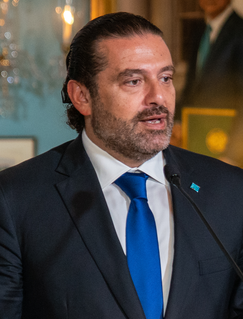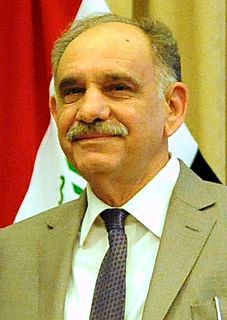A Quote by Saddam Hussein
Our relations with Iran have witnessed grave crises because of the policies of successive regimes in Iran which have considered Iraq and the Arab homeland, particularly the Arab Gulf area, as a sphere for domination and influence.
Related Quotes
By accident of geography, the world's major oil resources are in Shi'ite-dominated areas. Iran's oil is concentrated right near the gulf, which happens to be an Arab area, not Persian. Khuzestan is Arab, has been loyal to Iran, fought with Iran not Iraq during the Iran-Iraq war. This is a potential source of dissension. I would be amazed if there isn't an attempt going on to stir up secessionist elements in Khuzestan.
During the rule of the Shah, arrogance, aggression, territorial expansion at the expense of the Arabs and attempts to harm Iraq's national sovereignty and the rights of the Arab nation were a constant pattern. Iraq and the Arab nation were regarded as a sphere of influence for the expansionist plans of Iranian interests. That policy has been followed throughout history by the State of Persia against its neighbours to the west, and as we have shown.
The current relationship between Syria and Iran is abnormal. It is unprecedented in Syria's foreign policy history. A new Syria will be an indispensable part of the Arab League and it will work on improving the role of the Arab League and the role of Arab states regionally, specifically because they took a historic and unprecedented decision to back the Syrian people.
The Iranians are Moslems and the Iraqi are Moslems. Both are certain that there is no God but Allah and that Mohammed is his prophet and believe it with all their hearts. And yet, at the moment, Iraq doesn't trust Iran worth a damn, and Iran trusts Iraq even less than that. In fact, Iran is convinced that Iraq is in the pay of the Great Satan (that's God-fearing America, in case you've forgotten) and Iraq counters with the accusation that it is Iran who is in the pay of the Great Satan. Neither side is accusing the Godless Soviets of anything, which is a puzzle
When we strengthen our relations with the Gulf states, when we cooperate with the Arabs, everybody asks if we are looking for a new geopolitical place. But in the Middle East and the Gulf, you can find German, French and British goods everywhere. German relations to these states are very good, as are English and French relations. Does this make them Arab-oriented?
We have never said that the fight against the Iranian aggression and against the expansionist Persian tendencies (which have been demonstrated by various means under successive regimes in Iran) is the decisive battle for the Arabs. What we have said, and still say, is that the fight against Zionism is the main decisive battle for the Arabs. This is a great objective reality, which cannot be denied or underestimated except by someone who would not only harm the Arab nation and its main causes, but would also overlook the main danger.





























